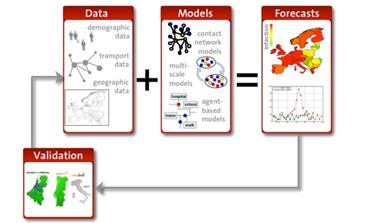The 'Living Earth Simulator' will mine economic, environmental and health data to create a model of the entire planet in real time.
When it comes to global crises, we're not short of complex systems that look close to the edge: the climate, the food supply, energy security, the banking system and so on. Add to this the threat of war in many parts of the world and the possibility of global pandemics and it's a wonder that anybody gets out of bed in the morning.
Science has certainly played an important role in understanding aspects of these systems but could it do more?
Today, Dirk Helbing at the Swiss Federal Institute of Technology in Zurich outlines an ambitious project to go further, much further.
Helbing's idea is to create a kind of Manahattan project to study, understand and tackle these techno-socio-economic-environmental issues. His plan is to gather data about the planet in unheard of detail, use it to simulate the behaviour of entire economies and then to predict and prevent crises from emerging.
Think of it as a kind of Google Earth for society. We've all played with Google's 3D map of the Earth that uses real data to reveal not only the town where you live and work but your home and back garden too.
Imagine a similar model that uses in real time things like financial transactions, health records, travel details, carbon dioxide emissions and so on to build a model of not just the planet but the entire society that populates it. Helbing calls it 'reality mining'.
This model will be capable not only modelling the planet in real time but of simulating the future, rather in the manner of weather forecasters.
Helbing's simulator will look for economic bubbles and collapses, warn of global pandemics and suggest how to tackle them, it will model and predict the outcome of regional conflicts and determine the effect of our behaviour on the climate. He even wants to create 'situation rooms' in which global leaders can view and manage crises as they occur.
This Google-Earth-on-steroids is to be called the Living Earth Simulator and Helbing's plan is to have it working by 2022 at a cost of a cool EUR 1 billion, funded by the European Commission. He's even assembled an impressive team to help, including partners from most of the top universities in Europe.
So what to make of this plan and it's ambition. At first glance, it seems a somewhat worrying, even frightening, vision of the future. A Living Earth Simulator will change how we see ourselves and our planet in ways that are hard to imagine right now.
There's no question that we need to better understand the global nature of the society we live in and the effects that it has on the planet. We also need to know how to leverage the benefits of these global systems while limiting the downsides they can generate.
This capability is coming whether we like it or not. Clearly, the computing infrastructure of the near future will be increasingly capable of such a task.
The great worry, of course, is that it will not be the great public universities and government-funded research institutes that complete this task. The huge benefits of a Living Earth Simulator will make it a valuable tool for insurance companies, financial traders, global businesses and even search engines.
It's not hard to imagine a company like Google wanting and even building such a model. And if that seems hard to swallow, there are plenty of organisations that may be even less palatable operators of such a system. Imagine a Goldman Sachs Earth Simulator or one run by the People's Liberation Army. EUR 1 billion is just a small fraction of the money these organisations play with.
When viewed through that prism, it seems clear and even necessary that such a project is publicly funded and managed. Should the European Commission agree, Helbing, who is a world leader in the new science of techno-socio-economic studies, may well be the man who leads it.
A Living Earth Simulator is coming, one way or another, perhaps even to your living room or mobile communicator. The only question is who builds it.
Ref: arxiv.org/abs/1004.4969: The FuturICT Knowledge Accelerator

